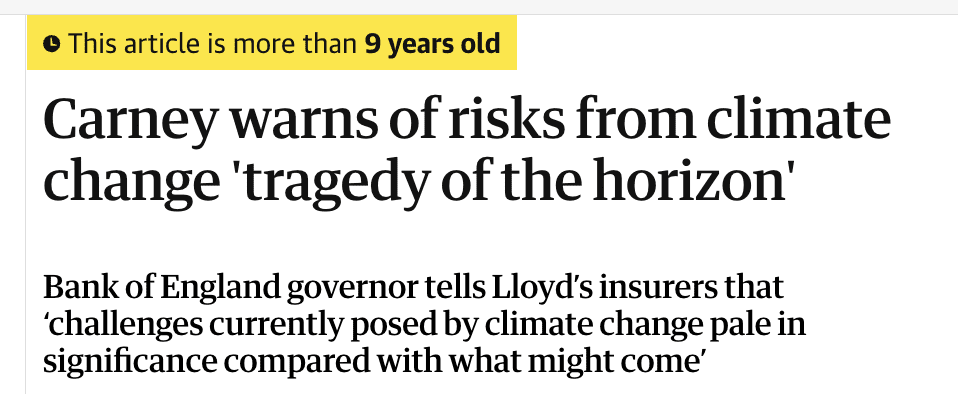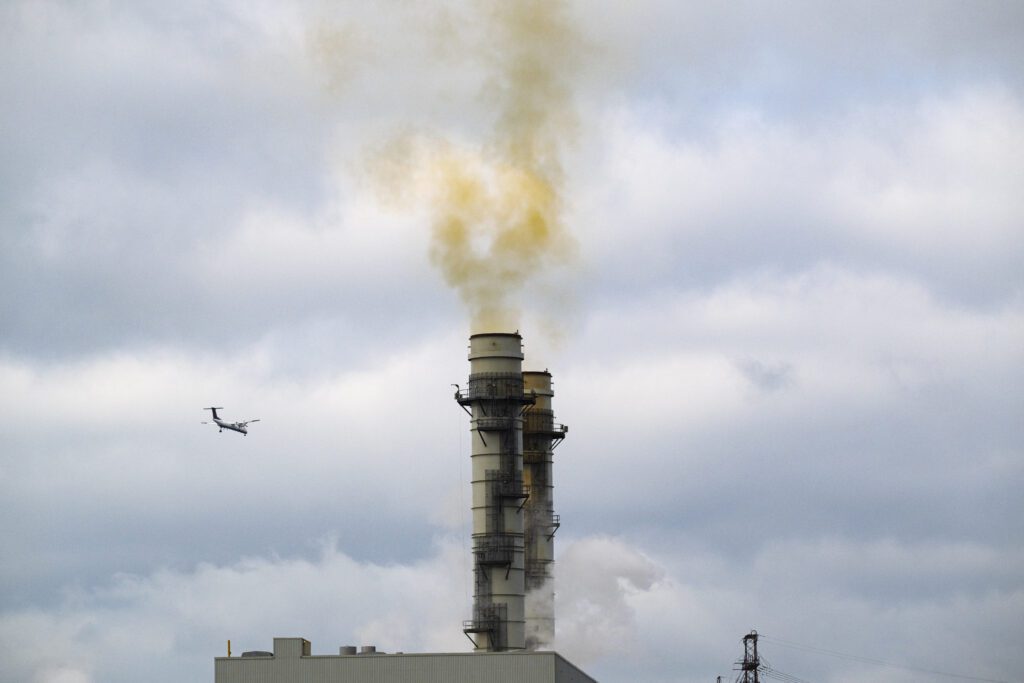Today marks the biggest anniversary you’ve never heard of.
Exactly a decade ago, Prime Minister Mark Carney stood in black tie before a room of similarly attired financial elites and delivered a speech that sent shockwaves through the financial sector. For the first time, he sounded the alarm that climate change would significantly damage the financial world unless immediate action was taken.
PM Mark Carney was the guest speaker at the 2015 Lloyds London Annual City Dinner. Lloyd’s of London, the organizers of the event, are the world’s largest insurance market where companies go to find insurance. As such, they are uniquely placed to think carefully about risk.
This talk became known as the ‘Tragedy of the Horizon’ speech. Prime Minister Carney drew attention to the significant impending risks that climate change would cause, and how the short-term cycles of politics and business meant we are not properly addressing the long-term risks of climate change.
“In other words, once climate change becomes a defining issue for financial stability, it may already be too late.”
The speech dug into particular risks faced by the insurance industry, physical risks and the problems with not accounting for the energy transition and shifting demand for fossil fuels. The core policy suggestion of this speech was for more direction around climate disclosures – details around the risks companies face from climate so that investors can make sensible decisions.
Although this doesn’t sound ground-breaking by today’s standards, it made significant headlines:



There were direct, material repercussions from PM Mark Carney sounding the alarm on the need for better information on climate change risks for the financial sector. In late 2015, the Taskforce for Climate-related Financial Disclosure (TCFD) was established. The press release announcing this initiative mentioned PM Carney and the speech explicitly. TCFD created a global framework guiding companies to explain how climate change affects their business, allowing investors and the public to clearly see risks and opportunities. It has become a cornerstone of global climate finance, emerging directly from PM Carney’s 2015 address.
An awful lot has changed in a decade.
This speech was made before the COP21 Paris Climate Summit. It came before the International Panel on Climate Change’s (IPCC) groundbreaking 2018 report, which warned that unprecedented and urgent emissions reduction was needed to limit the worst impacts of climate change. It preceded the 2021 International Energy Agency report citing that no new fossil fuel projects could be approved if we had any chance of meeting our net-zero goals.
Since 2015, Canada has experienced $42.9 billion of insured losses from catastrophic weather events, linked to climate. Since 2021, Canada’s banks have provided $483.7 billion of financing to fossil fuel companies. Around the world, wildfires, floods, extreme heat, drought and other climate impacts have taken countless lives and devastated communities. Climate change has continued to worsen over the last decade. We do not live in the same world which we did in 2015.
So ten years after the Tragedy of the Horizon speech, has climate finance ambition advanced accordingly? The unfortunate reality is that the financial sector lags far behind where it must be to address the climate crisis.
Though incomplete, climate disclosure has spread throughout the global economy. Yet the money isn’t shifting; disclosure has become merely a box-ticking exercise. No regulations exist requiring financial institutions to act on the information disclosure provides.
Disclosure operates on the false premise that with the correct information, the market will align with climate-action. In PMCarney’s view, more information means investors “can judge who’s doing well and who isn’t”.
In reality, more information simply makes us more aware of the scale of the climate crisis. Financial institutions operate to maximize quarterly profits for shareholders. Information about medium-term climate impacts cannot disrupt this short-term profiteering cycle, especially when fossil fuels continue generating immediate profits.
As we shared in Climate Cents #5, you can’t out-disclose a crisis you’re still funding.
What is required is for financial regulators to implement rules to make sure that information is being used properly. This means the mandatory adoption of climate-aligned plans which outline how companies will help meet targets to keep temperature increase below 1.5 degrees. Additionally, financial regulators must implement policies which encourage financing climate solutions while restricting financing to fossil fuels.
Working in climate finance feels at times like listening to a broken record. A decade ago PM Mark Carney called for mandatory climate disclosure – today, despite his position as Prime Minister of Canada, climate-related disclosure is not yet required by all companies across the Canadian economy. More is urgently needed.
As we mark the tenth anniversary of PM Mark Carney’s prescient warning, Canada stands at a defining moment in its climate finance journey. The tragedy he foresaw is no longer on the horizon—it’s unfolding in real-time across our communities. The next decade of climate finance must be defined not by more warnings and information, but by decisive action that aligns our financial flows with the future we want to create.








